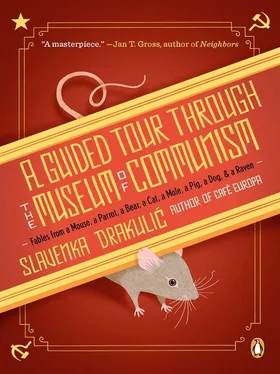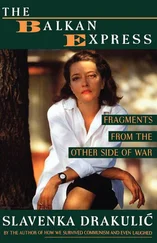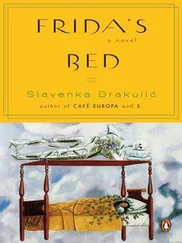My mother’s only comment was an exclamation mark. My comment, however, is that it is not easy to believe that the writer of this report, based probably on an agent watching the house, perhaps even to ensure that the designated persona finished his task, would express himself in such poetic language. But evidently, in this country, poetry and fiction are more normal than news and information.
At the very end of her glued-in notebook there are only a few additional notes. In 1985 she wrote: “The first secretary is dead, finally.” The other is from 1991, written in pencil again: “Today the two minister’s sons were released from prison.” And again, a couple of months later: “The first secretary’s wife is in jail!” The last note is from November 19, 2001: “The remains of the minister found.”
Of course, I understand that the reason my mother kept her diary in secrecy was because of the strange witness whose identity she kept to herself—but also because she mentioned the forbidden topic, the first secretary’s illness. But it still fascinates me that she died believing that this secret should not be revealed, at least not during her lifetime. I understand that she had no strength left anymore. She feared for me, although I managed to stay in America, to her great joy as well as sorrow, because she could not see me more often.
You see, she lacked faith in democracy. I guess she was not alone; her whole generation did not trust any government at all. Perhaps with good reason. Never mind the political changes; there are still forces and people at work here that could have harmed her, perhaps even me. Indeed, many people in power are the same ones from before! Therefore, better to hush it up, she must have thought. Instead she kept a secret diary and never dared to even mention it to me, not even so many years after the fall of Communism in Albania. Especially not to me. Knowledge of any kind was a curse in our society. The more access to knowledge and information a person had, the more suspicious it was. Therefore, we had a ban on watching foreign TV shows or listening to foreign radio news programs.
She pulled all her strings to send me to America. She did it for a specific reason: Namely, even long after the first secretary’s family had lost its power, she was still afraid of the possible consequences. She was insistent, although I was her only child and she was divorced. I resisted… stupid me! I was young, and my friends were the most important thing to me. I did not care as much about the future; they did not teach us to be ambitious. On the contrary, we learned that we didn’t have to worry; the state would take care of us. And that it was normal to build some seven hundred thousand bunkers to protect us from an imaginary enemy.
As I told you, I am convinced that she must have known exactly who Raven was, perhaps she even knew him personally (he did not come to her for nothing), but she kept the identity of the person to herself. And his terrible secret as well. That event changed my mother’s life and mine. The consequences for her were serious: She stopped believing in the leadership of the Communist Party and, moreover, in Communism as a system. She lost the comfort of thinking that Albanian Communism was just a matter of the wrong people in the wrong place—that the idea was right, only the practice was wrong.
The other day, during my mother’s funeral, seeing her old friends, some of them also ghosts of times past (like the director of the hospital, a party strongman), I suddenly remembered one event. Just before I left for America in 1994 I had a meeting in the Daiti Hotel with a relative who was supposed to arrange for my visa. There I saw the younger son of the late first secretary. He had no real power, except for the power of his family name.
The son looked astonishingly like his father, tall and good-looking. Therefore, whenever he entered the Daiti Hotel, everybody looked at him a bit startled, even those who knew him well. As if the spirit of the dead patriarch was walking among them. Looking at him you suddenly found yourself in the company of a ghost. But was he a ghost, I wonder? At least, in 1994 the son was greeted with such reverence that I found it perplexing to see. Demonstrating reverence (born out of fear of his father) to this insignificant son, they bowed to the shadow of a man and his times—and not to the shadows of the thousands of people executed or dead in labor camps and prisons during his reign. So yes, in his presence people were reminded of his father, and this is how the late first secretary continued to live on for yet another generation. Reading my mother’s diary, I wondered: How much longer will Albania live with its ghosts?
But on the other hand, my mother did not burn her diary, though she could have done so. She had both the time and the opportunity, and I am sure she contemplated it. Today I take this as a good sign, a sign of faith in me, in the next generation. This is the reason why I brought the diary to you, to make it public in whatever form you see fit. It is about time!
SLAVENKA DRAKULIĆ was born in Croatia in 1949. Her nonfiction books include How We Survived Communism and Even Laughed , a feminist critique of Communism that brought her to the attention of the public in the West; The Balkan Express: Fragments from the Other Side of War , a personal eyewitness account of the war in her homeland; Café Europa: Life After Communism (Penguin); and They Would Never Hurt a Fly (Penguin). Drakulić is also the author of the novels Holograms of Fear , which was a bestseller in Yugoslavia and was short-listed for The Best Foreign Book Award by The Independent (UK), The Marble Skin, The Taste of a Man (Penguin), S. (Penguin), and Frida’s Bed (Penguin). A writer and journalist who was published in The New York Times, The New Republic, The New York Book Review, and The Nation (where she is a contributing editor), as well as many other European magazines and newspapers, she now lives in Sweden and Croatia.

Advance Praise for A Guided Tour Through the Museum of Communism
“Orwell taught us in Animal Farm that a satirical fable could introduce us to Stalinism. For our own postcommunist age, Slavenka Drakulić summons her own group of animals, each with its own literary genre, and each with a story to tell about life in a communist country. The mouse and the mole, the pig and the parrot, the raven and the bear, the cat and the dog, all seek and find ways to remind us of a time and place, and so teach us the difference between stale commemoration of the graying past and the warmth and wetness and dread and darkness of life truly and bravely recalled. This daring triumph of literary style transforms a receding epoch into the eternal present, beautifully rendering the dilemmas of life under communism as sharp instances of moral tragedy and poignant examples of the limits of self-knowledge. Literature here is an aide de memoire, not just of historical experience, but of why we choose to forget.”
—Timothy Snyder, author of Bloodlands: Europe Between Hitler and Stalin
Praise for Café Europa: Life After Communism
“Profound and often bitingly funny… you’ll never think about capitalism, modern history, or your perfect, white, American teeth in the same way again.”
—Elle
“Insightful… Café Europa not only helps to illuminate the political and social problems facing most of Eastern Europe, but also sheds new light on the daily life of its residents, their emotional habits, fears, and dreams…. Moving and eloquent.”
Читать дальше













